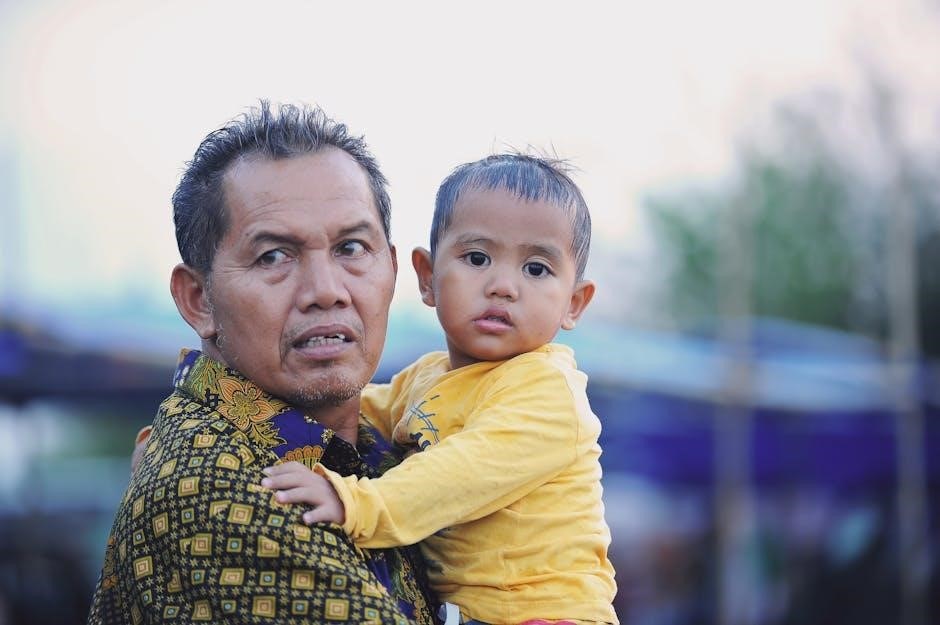Founded in 1977‚ Parenting with Love and Logic offers a research-driven approach to raising children․ It balances love and logic to foster responsibility‚ emotional intelligence‚ and calm homes․ Over 900‚000 copies sold worldwide‚ this philosophy helps parents set limits with empathy and teach life lessons through natural consequences‚ creating confident‚ motivated kids ready for the real world․
Overview of the Philosophy
Parenting with Love and Logic‚ developed by Foster W․ Cline and Jim Fay‚ is a research-driven philosophy that emphasizes a balanced approach to raising children․ Founded in 1977‚ it focuses on creating a nurturing environment where kids learn responsibility and accountability through natural consequences․ The approach combines empathy and understanding with clear boundaries‚ helping parents avoid power struggles while fostering emotional intelligence․ By locking in love and logic‚ parents guide children to make wise decisions‚ preparing them for real-world challenges․ This method has gained global recognition‚ offering practical tools for educators and families to cultivate confident‚ motivated‚ and resilient individuals․ Its timeless principles continue to empower parents to raise children with character and independence․
Importance of Balance in Parenting
Balanced parenting is the cornerstone of the Love and Logic approach‚ ensuring a harmonious blend of empathy and structure․ Parents learn to avoid extremes‚ whether overly permissive or overly strict‚ fostering an environment where children feel secure and valued․ This balance helps kids develop self-confidence and responsibility‚ as they experience both unconditional love and consistent‚ logical consequences․ By maintaining this equilibrium‚ parents guide their children toward emotional intelligence‚ resilience‚ and independence․ The philosophy teaches that balance is key to raising children who are both respectful and self-assured‚ ready to navigate life’s challenges with confidence and integrity․

Key Principles of Parenting with Love and Logic
Love and Logic combines unconditional love with logical consequences‚ fostering mutual respect and responsibility․ It emphasizes natural consequences‚ empathy‚ and consistent limits to guide children toward independence and self-confidence․
The Role of Love in Parenting
Love serves as the foundation in Parenting with Love and Logic‚ ensuring children feel safe and valued․ It emphasizes unconditional support‚ fostering emotional security and trust․ Parents prioritize empathy‚ understanding‚ and validation‚ creating a nurturing environment where kids feel heard and respected․ This approach encourages open communication‚ helping children develop self-esteem and resilience․ By locking in empathy before setting consequences‚ parents teach responsibility while maintaining a loving relationship․ Love in this context is not permissive but intentional‚ guiding children to make wise choices and learn from their mistakes․ This balance helps kids grow into confident‚ independent individuals with strong character and emotional intelligence․
The Role of Logic in Parenting
Logic in Parenting with Love and Logic provides structure and accountability‚ teaching children responsibility through natural consequences․ It emphasizes setting clear limits and allowing kids to learn from their mistakes‚ fostering accountability and problem-solving skills․ This approach ensures children understand the impact of their actions‚ promoting self-regulation and preparedness for real-world challenges․ Logic balances love by offering consistent‚ fair boundaries‚ helping kids develop a sense of duty and resilience․ By experiencing consequences in a loving environment‚ children learn to make wise decisions and take ownership of their choices․ This logical framework guides them toward independence‚ equipping them with the skills needed to navigate life confidently and responsibly․

Mutual Respect in Parent-Child Relationships
Mutual respect is a cornerstone of Parenting with Love and Logic‚ fostering a healthy‚ positive relationship between parents and children․ It involves adults setting firm‚ loving limits without anger or threats‚ ensuring children feel valued and understood․ This approach encourages open communication‚ allowing kids to express their feelings and thoughts respectfully․ By modeling respect‚ parents teach children the importance of empathy and kindness․ Mutual respect creates a safe environment where children thrive emotionally‚ developing confidence and self-worth․ It also helps children understand boundaries and develop self-discipline‚ leading to stronger‚ more respectful relationships․ This foundation of respect is vital for raising responsible‚ compassionate individuals prepared for life’s challenges․
The Two Basic Rules of Love and Logic
Parenting with Love and Logic is built on two foundational rules designed to create a balanced‚ respectful‚ and nurturing environment․ The first rule states that adults set firm limits in loving ways‚ without anger‚ lectures‚ or repeated warnings․ This ensures boundaries are clear while maintaining a warm‚ supportive relationship․ The second rule allows children to experience the natural or logical consequences of their actions‚ helping them learn responsibility and problem-solving skills․ These rules work together to foster independence‚ self-confidence‚ and emotional intelligence in children․ By following these principles‚ parents guide their kids toward making wise decisions while maintaining mutual respect and understanding․ This approach creates a strong foundation for children to thrive in life․

Effective Strategies for Implementing Love and Logic
Strategies include setting limits with love‚ using natural consequences‚ and locking in empathy․ These approaches help children develop responsibility and character while maintaining a loving relationship․
Setting Limits with Love
Setting limits with love is a core aspect of the Love and Logic approach․ It involves establishing clear boundaries while maintaining a warm and empathetic relationship with children․ Parents are encouraged to set firm limits without resorting to anger‚ lectures‚ or threats․ This method ensures that children understand the consequences of their actions in a loving and supportive environment․ By combining love with logical boundaries‚ parents can help their children develop self-discipline and responsibility․ This approach fosters a sense of security and respect‚ allowing children to thrive emotionally and socially․ It’s about guiding children with kindness while teaching them important life lessons․
Using Natural Consequences to Teach Life Lessons
Natural consequences are a powerful tool in the Love and Logic approach‚ allowing children to learn from their mistakes in a real-world context․ Parents are encouraged to let children experience the logical outcomes of their actions‚ provided they are safe and age-appropriate․ For example‚ if a child forgets their lunch‚ they might feel hungry until they can eat at home․ This approach fosters accountability and problem-solving skills․ The key is to deliver consequences with empathy‚ ensuring children understand the connection between their choices and outcomes․ By doing so‚ parents help children develop self-responsibility and preparedness for life’s challenges․ This method avoids power struggles and promotes a deeper understanding of cause and effect‚ guiding children toward maturity and independence․
Locking in Empathy and Understanding
Empathy is a cornerstone of the Love and Logic approach‚ ensuring children feel heard and validated before consequences are introduced; Parents are encouraged to “lock in” empathy by acknowledging their child’s perspective‚ which fosters trust and cooperation․ This step is crucial‚ as it helps children understand that their feelings are recognized‚ even as limits are set․ By expressing genuine understanding‚ parents create a safe space for children to reflect on their actions․ This approach reduces resistance and encourages children to take ownership of their decisions․ Teaching empathy also helps children develop emotional intelligence‚ a vital skill for navigating life’s challenges․ The goal is to guide‚ not dictate‚ while fostering mutual respect and a deeper connection․
Teaching Responsibility and Character Development
Teaching responsibility is a key aspect of Love and Logic‚ helping children develop accountability and integrity․ By allowing kids to experience natural consequences‚ parents guide them toward understanding the impact of their choices․ Empathy and mutual respect are emphasized to foster a sense of duty and self-awareness․ This approach encourages children to take ownership of their actions‚ building a strong moral compass․ Love and Logic equips parents with practical tools to nurture responsibility‚ preparing children for real-world challenges․ The goal is to raise self-confident individuals who can think critically and make ethical decisions‚ laying the foundation for lifelong character development and resilience․

Real-World Applications of Love and Logic
Love and Logic offers practical strategies for everyday challenges‚ transforming homes and classrooms into environments of calm and cooperation․ Its methods are proven to reduce power struggles and foster emotional intelligence‚ equipping parents and educators with tools to handle real-world situations effectively‚ promoting resilience and responsibility in children․ Over 900‚000 copies sold worldwide‚ this philosophy has become a trusted resource for raising confident‚ motivated kids․ By balancing love and logic‚ parents can create a nurturing yet structured environment that prepares children for life’s challenges‚ ensuring they grow into self-confident‚ motivated individuals ready to thrive in the real world․
Handling Power Struggles with Ease
Love and Logic equips parents with effective strategies to navigate power struggles calmly․ By setting clear limits with empathy‚ parents avoid anger and lectures‚ fostering cooperation․ Natural consequences teach children responsibility without resentment․ This approach encourages mutual respect‚ reducing conflict and promoting emotional intelligence․ Parents learn to stay calm‚ offering choices that empower kids while maintaining healthy boundaries․ Over 900‚000 copies sold worldwide‚ this method is trusted for transforming challenging moments into opportunities for growth‚ helping children develop self-confidence and readiness for life’s challenges․ By balancing love and logic‚ parents create a nurturing environment that prepares kids to thrive in the real world․
Encouraging Emotional Intelligence in Children
Love and Logic helps parents foster emotional intelligence by teaching empathy and understanding․ By validating feelings and offering choices‚ parents empower children to manage emotions effectively․ Natural consequences guide kids to reflect on their actions‚ fostering self-awareness․ This approach encourages open communication‚ helping children express emotions constructively․ Parents learn to stay calm‚ modeling healthy emotional regulation․ Over time‚ children develop resilience and strong relationships․ Love and Logic’s methods ensure kids grow into emotionally intelligent individuals‚ ready to navigate life’s challenges with confidence and poise‚ setting them up for long-term success and happiness․
Parenting with Love and Logic offers a timeless‚ research-backed approach to raising confident‚ responsible children․ By balancing love and logic‚ parents create a calm‚ respectful home environment where kids thrive․ This philosophy teaches children to navigate life’s challenges through natural consequences‚ empathy‚ and self-awareness․ With its focus on mutual respect and healthy boundaries‚ Love and Logic empowers parents to guide their children toward emotional intelligence and strong character․ Over 900‚000 copies sold worldwide‚ this approach has proven to be a trusted resource for families and educators․ Its enduring success lies in its ability to foster resilience‚ responsibility‚ and lifelong success in children‚ making it a invaluable guide for parents seeking effective‚ compassionate parenting strategies․
